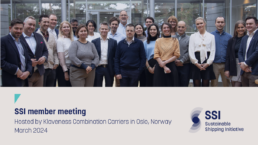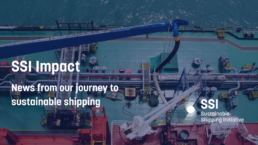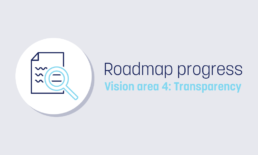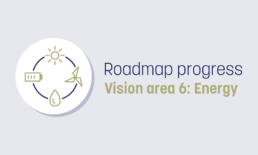SSI Impact: News from our journey to sustainable shipping - 03/2024
The SSI Newsletter is published quarterly and is the place to find news from the SSI community, our partners and the impact of our collective work along our journey to a sustainable shipping industry.
Subscribe to SSI Impact: News from our journey to sustainable shipping
The Mission to Seafarers joins Sustainable Shipping Initiative and highlights needs for seafarers to be front and centre in shipping transition
LONDON, 11 April 2024 – The Sustainable Shipping Initiative today announces The Mission to Seafarers as its newest member, further highlighting the importance of seafarers and seafarers’ rights and welfare in building a sustainable maritime industry.
SSI members, spanning the maritime ecosystem, are united by the belief that sustainability needs to be a core priority for the sector – and that a sustainable industry considers all three elements of ESG – environmental, social and governance. SSI’s ongoing work on seafarers’ rights and welfare has resulted in the Delivering on seafarers’ rights Code of Conduct (developed with the Institute for Human Rights and Business and the Rafto Foundation), and has supported the development of the RightShip Crew Welfare Tool.
Moving forward, and with the added support of the Mission as a full member, SSI will continue to advocate for the importance of seafarers to the shipping sector as it works to decarbonise – as valued stakeholders and experts on the specific challenges of operating a zero-emission vessel and on the impacts of new technologies and ways of working on life at sea.
”We are delighted to be joining the Sustainable Shipping Initiative at a time when the industry is facing tough choices toward meeting their ESG goals. Seafarers are at the forefront of delivering change for industry, and yet often their voice can get drowned out. We have worked with SSI on a number of initiatives in recent years, and feel the time is right for us to formally unite. We look forward to giving crews the voice they deserve in this vital working group.” Ben Bailey, Director of Programme, The Mission to Seafarers
SSI’s CEO Steven Jones said: “Seafarer well-being is not just an ethical imperative, it’s essential for a sustainable shipping industry. By uniting all those committed to supporting positive change for seafarers, we can ensure a truly just transition towards a more sustainable maritime sector. One that places seafarers at the heart of everything we do. This collaboration benefits everyone and we are delighted to welcome the Mission to Seafarers to the SSI. Not only as a voice for seafarers but as a catalyst for change, ensuring positive discussion translates into real world improvements in the lives and experiences of all at sea.”
- ENDS -
Notes to Editors
For more information, interviews or comment please contact Steven Jones, Sustainable Shipping Initiative (s.jones@sustainableshipping.org) or BLUE Communications (mission@blue-comms.com).
About the Sustainable Shipping Initiative
The Sustainable Shipping Initiative (SSI) is a multi-stakeholder collective of ambitious and like-minded leaders, driving change through cross-sectoral collaboration to contribute to – and thrive in – a more sustainable maritime industry. Spanning the entire shipping value chain, SSI members are shipowners and charterers; ports; shipyards, marine product, equipment and service providers; banks, ship finance and insurance providers; classification societies; and sustainability non-profits.
About Mission to Seafarers
The Mission to Seafarers provides help and support to the 1.89 million men and women who face danger every day to keep our global economy afloat. The Mission works in over 200 ports in 50 countries caring for seafarers of all ranks, nationalities and beliefs. Through its global network of chaplains, staff and volunteers, the Mission offer practical, emotional and spiritual support to seafarers through ship visits, drop-in seafarers' centres and a range of welfare and emergency support services, including a growing number of digital welfare solutions.
To learn more about The Mission to Seafarers, visit www.missiontoseafarers.org
SSI members meet in Oslo

26 March 2024 – SSI members spent two days together in Oslo for the SSI bi-annual member meeting, hosted by Klaveness Combination Carriers (KCC).
Day 1
KCC CEO, Engebret Dahm, kicked off the meeting by highlighting how increasing efficiencies can be a win-win for an organisation looking to optimise operations and reduce emissions. He emphasised the unique space the combination carriers occupy in the market, allowing for trade efficiencies and limiting the amount of ballast voyages. He further reflected on KCC’s recent A- score for ‘climate change’ in the annual CDP disclosure, a step above the maritime transport industry average of B-.
This was followed by a session on KCC’s decarbonisation work, emphasising their focus on trading efficiency, vessel efficiency, and voyage efficiency as strategic pillars, and on innovative ways to finance and incentivise sustainable behaviour. The collaboration between SSI members KCC and South32 was used as an example of industry leadership and collaboration, as the two companies have a six year sustainability-linked freight contract which provides incentives for emission reduction.
SSI member meetings often bring guests to share latest developments across various areas of interest. This time, guests from Yara Clean Ammonia, YoungShip, and HUB Ocean led sessions providing insights into their organisations and activities.
Yara Clean Ammonia spoke about the expected increase in ammonia demand leading to 2050, estimating that approximately 40% of ammonia demand by 2050 will come from shipping. They highlighted current efforts to ensure technological readiness for green ammonia production as well as pilot projects intended to test and facilitate learning, adapting existing knowledge from using ammonia as cargo to develop guidance and procedures on ammonia as a marine fuel.
YoungShip, a global network of young people working in the maritime industry, has a strong Oslo branch and shared the work YoungShip does to empower the next generation of maritime leaders. They also highlighted their collaboration with industry actors and their use of events and networking to create awareness of sustainability challenges among its members. On discussing the strong sustainability focus within the YoungShip membership, it was felt that a sustainable shipping mentorship scheme could be a powerful mechanism. One that could provide the right relationships and insights to ensure that next generation maritime professionals can move forward in their careers with the necessary levels of empowerment, support, and information.

Focus on ocean
The second part of the day focused on oceans, linking to vision area 1 of the SSI Roadmap to a Sustainable Shipping Industry as well as to the recently announced State of Sustainable Shipping (SoSS) programme, which has received funding from the Lloyd’s Register Foundation.
HUB Ocean was the first to present, focusing on the potential of data to support the protection of our ocean and marine biodiversity. HUB Ocean brings together scientists, governments, and industry; and creates opportunities for collaboration, transparency, and data sharing. They emphasised shipping’s role in increasing the knowledge of our oceans, since in addition to using HUB Ocean’s platform, the maritime sector can also contribute data and help create a fuller picture of the state of the ocean.
This was followed by engaging insights from the WWF Global Arctic Programme on the sensitive marine ecosystem and biodiversity in the Arctic and the need for this to be safeguarded. The role of data in enabling conservation work was also emphasised, showcasing tools that can support the mapping of whale migration routes (so-called blue corridors) as well as assess the environmental impacts of Arctic shipping.
This set the scene for an engaging session on the State of Sustainable Shipping programme. Attendees were presented with the progress made and all were brought together to discuss insights gained so far through breakout groups. The session was an opportunity for members to provide inputs on and shape SSI’s future research on Oceans and SoSS.
Closing off day 1, members were encouraged to reflect on the day and their needs and expectations from SSI ahead of day 2. They reflected on the small, open environment SSI member meetings provide for discussion, and the need for sustainability to be a collaborative area where different stakeholders can come together and discuss knowledge gaps and challenges faced. In the evening, everyone was treated to dinner and a tour of the Fram museum, showcasing the first Norwegian vessel built for polar research and to reach the North Pole, highlighting the importance of maritime for discovery and developing our understanding of nature.
Day 2
The second day built on the momentum previously generated, focusing on SSI’s current activities and working groups. The morning was spent on working group updates, providing an opportunity for members to give inputs on, and set the future direction of, the projects SSI is currently engaging in. Focus was also placed on celebrating the successes of the Delivering on seafarers’ rights Code of Conduct as well as last year’s Green Steel in Shipping report.
The day also featured breakout sessions to explore a new SSI focus on sprint challenges. These are a series of short projects with tightly designed goals. In this approach, the research and development are tied to an agile solution-finding process. Split into groups, SSI members took the chance to explore which areas they believe would benefit from this approach, while seeking to ensure they tied into SSI’s goals and member needs.
Member insights
A.P. Moller-Maersk recently had their science-based targets validated – the first company to do so under the shipping guidance released in 2023. They shared the process they underwent to achieve the validation, as well as insights on the maritime guidance. This was followed by a discussion around setting realistic, science-based decarbonisation goals and the challenges that come with it, particularly in terms of the effort required to collect data and establish a credible baseline upon which to base emission reduction targets.
This was followed by a policy session hosted by WWF, where the ongoing MEPC81 talks took centre stage. A summary of developments at the IMO since the adoption of the updated GHG strategy was provided, as well as the proposals currently on the table for the so-called ‘basket of measures’ to be negotiated by Member States, which include considerations of technical (e.g. a GHG fuel standard) and economic elements (e.g. emission pricing).

Finally, the two days were finished off with a set of reflections on SSI engagement and the crucial role that relationships play in the success of SSI as a small organisation. Members were encouraged to share SSI’s work internally within their organisations and to share events on their radar for the remainder of 2024 that could be used to further champion SSI’s work.
On the meeting, KCC’s member representative to SSI, Jarle Kvarneggen, said: “Klaveness Combination Carriers was proud to host the recent Sustainable Shipping Initiative (SSI) meeting. Our goal was to create a setting that would foster a dynamic and engaging atmosphere over two full days. The event’s success, however, was truly driven by the enthusiasm and expertise of our members and guests. Their shared insights, achievements, and challenges were the heart of this productive and invigorating gathering. Through SSI, we gain valuable perspectives from various organizations and businesses throughout the maritime industry’s value chain. This collaboration is a clear testament to our collective potential to make a significant, positive impact, accelerating our journey toward a decarbonized and sustainable shipping industry.”
SSI CEO Steven Jones said: “There is nothing quite like the energy of a group coming together with unified purpose and vision. Through two days we were able to tackle so many sustainability issues, to learn from each other and help drive better and more equitable change moving forward. The maritime community in Oslo, both SSI members and guests, is a wonderful proving ground for the developments which are vital to build on the visions and foundations of sustainable shipping. So, we were extremely grateful to the Klaveness Combination Carriers team for their hospitality, and to everyone who joined us. We built bonds, cemented old and new friendships alike, and saw how the Norwegian scientific and maritime leaders of the past, such as Fridtjof Nansen and Roald Amundsen, have so many lessons for our future.”
Thank you to all the members and guests who attended and spent two days with us in Oslo!
Insights from SSI CEO at YoungShip Liverpool "BattleShip: Industry v Academia" challenge
Tuesday 27 February 2024 – Shipping experts and students convened at Liverpool John Moores University for the YoungShip Liverpool “BattleShip: Industry v Academia” challenge. SSI CEO Steven Jones discussed the challenges and set the scene for the change-making power of young people to be the driving force for a brighter future. The spotlight was on sustainability, the pulse of the shipping industry, and the crucial role that the younger generation plays in shaping its future as the inseparable connection between sustainability and shipping grows ever more significant.
Steven delved into the challenges of building a sustainable future for maritime, with the ‘Roadmap to a sustainable shipping industry’ marking a journey through oceans, communities, people, transparency, finance, and energy and how these topics relate to shipping. The Roadmap serves as a foundation upon which we can build a brighter and more responsible future for shipping. The discussions looked beyond decarbonisation, into the wider issues of sustainability. For example, key issues such as freedom of navigation took precedence, and it was stressed that prosperity and peace are threatened without the ability to move freely across the oceans.
The concept of Green Corridors became a focal point, exploring the psychology behind them and making them a reality. Fundamental to this is questioning who is driving change and identifying those missing from the transformation journey – for example, most existing Green Corridor projects include only Global North. The audience also discussed whether seafarers felt brought along and considered part of the solution, or whether they were cut out of the conversation.
It was emphasised that there is no option but to change, evolve, and make improvements across shipping. While there are many first movers, and thankfully leading shipping companies have pushed themselves to the fore, there is hope for laggards in the industry.
There is no slowing down of the need to embrace sustainability, and so it is hoped that whether first or last, whether fast or slow, that change is now relentless, remorseless, and will deliver the results the planet and people need, for the peace and prosperity we want. Shipping is the connective tissue of continents, driving commerce, and underpinning modern life. It comes with an environmental cost, but the tide is turning towards sustainable practices. There remains a need for action, a desire for change, and progress. Sustainability must, therefore, stand as the better angels of shipping’s nature.

SSI Impact: News from our journey to sustainable shipping - 02/2024
The SSI Newsletter is published quarterly and is the place to find news from the SSI community, our partners and the impact of our collective work along our journey to a sustainable shipping industry.
Subscribe to SSI Impact: News from our journey to sustainable shipping
Seafarer Wellbeing in Focus: SSI CEO moderates panel at 'Sustainability at Sea'
Friday 16 February – The maritime industry is undergoing a crucial transformation, driven by an increasing focus on sustainability in its broadest sense. This extends far beyond environmental concerns, encompassing the wellbeing of the very people who keep our global trade afloat – seafarers. Recognising this critical aspect, the Seafarers Hospital Society (SHS) hosted “Sustainability at Sea: Why Seafarers’ Health Matters” at Trinity House in London.
The event convened various stakeholders, including seafarers, unions, shipping companies, and government officials, to explore key issues, including financial security, mental health, personal fulfilment, and collaboration and best practices. With a number of cadets in attendance, it was a great opportunity to explore the future of maritime employment and careers.
Among the speakers and panellists was Steven Jones, CEO of the Sustainable Shipping Initiative (SSI), who moderated a thought-provoking panel looking at seafarers and their health, wealth, and happiness. The discussions were lively and informative, and there was a general consensus that more needs to be done to support the well-being of seafarers.
The panel consisted of:
- Caroll Elliott & Marc Evans (SeaFit)
- Evangelia Maragou (Shout)
- Shaunna Carden (TogetherAll)
- Ceri Summers (FairWinds)
- Teresa Walshe & Michael Edwards (SAIL)
Beyond Medical Check-Ups: A Multifaceted Approach
While physical health remains paramount, the panel broadened the conversation to encompass financial security, mental wellbeing, and personal fulfilment. These interconnected elements play a crucial role in shaping the overall experience of seafarers, impacting their long-term commitment to the industry and contributing to a more sustainable maritime future.
Jones opened by recognising the need for a wide-angle approach to wellbeing, stating, “Seafarers are the backbone of our industry, and ensuring their holistic wellbeing is not just the right thing to do, it’s also essential for a sustainable future. It is vital to explore practical solutions and pave the way for positive change.”

The event focused on the resilience of seafarers, their mental health, and the seemingly constant growing demand for ever greater endurance. However, as demands grow, so too does the likelihood of failing mental health. People can only be resilient up to a point, and as panel after panel reminded us, seafarers are human! They need the same considerations and support as those ashore, just because crews perform amazing feats of endurance does not mean we can constantly ask for more, more, more. There is a limit.
A Call to Action for Positive Change
The Sustainability and Seafarers discussion serves as a crucial platform for raising awareness and sparking vital conversations about seafarer wellbeing. By bringing together key players from the industry we can foster collaboration and pave the way for actionable solutions.
SSI, committed to a sustainable maritime industry, strongly supports this view, and such efforts align well with our work with IHRB and Rafto Foundation on the Seafarers’ Rights Code of Conduct.
We believe that prioritising seafarer well-being is not just a moral imperative, but also a strategic investment in the future of our industry.
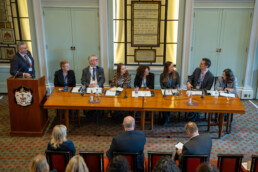
Join the conversation
The “Sustainability at Sea” event presents a unique opportunity to engage with pressing issues surrounding seafarer wellbeing. We encourage all industry stakeholders to participate in this important conversation and contribute to positive change for the maritime workforce. Together, we can build a more sustainable and equitable future for the maritime industry, where the well-being of seafarers is at the core of our success.
All images taken by the Seafarers Hospital Society (SHS).
China Stock Exchange Requires Mandatory Sustainability Reporting Requirements
Progress against milestone 4.2030.5:
Sustainability performance data is audited, validated and made publicly available.
Three of China’s major stock markets, the Shaghai Stock Exchange (SSE), Shenzen Stock Exchange (SZSE), and Beijing Stock Exchange (BSE) have published sustainability reporting guidelines for listed companies.
As part of this, mandatory disclosure on a broad range of ESG topics will be required in 2026.
Source: ESG today
Maersk aligns climate goals with SBTi Net-Zero Standard
Progress against milestone 6.2030.1:
Reduction in carbon intensity of international shipping to reduce GHG emissions by 90% by 2040 compared to 2008
A.P. Moller-Maersk has its plans to achieve net zero by 2040 verified by the Science-Based Targets initiative (SBTi).
Maersk is aiming for a 96% reduction in Scope 1 and Scope 2 emissions by 2040, against a 2022 baseline, and to reduce Scope 3 emissions by 90%.
Source: A.P. Moller Maersk
Maersk aligns climate goals with SBTi Net-Zero Standard
Progress against milestone 4.2030.5:
Sustainability performance data is audited, validated and made publicly available.
A.P. Moller-Maersk has its plans to achieve net zero by 2040 verified by the Science-Based Targets initiative (SBTi).
Maersk is aiming for a 96% reduction in Scope 1 and Scope 2 emissions by 2040, against a 2022 baseline, and to reduce Scope 3 emissions by 90%.
Source: A.P. Moller Maersk
EU introduces new 2040 climate target
Progress against milestone 6.2030.2:
Mid- and long-term measures implemented and national regulation incentivising and ensuring the uptake of zero (or low) carbon fuels and technologies in place.
The European Commission has recommended reducing the European Union’s net GHG emissions by 90% by 2040, relative to 1990. The 2030 climate target is to reduce net GHG emissions by at least 55% relative to 1990.
As part of this, the EU will give aviation and maritime priority access to alternative low- and zero-emissions fuels.
Source: European Commission



